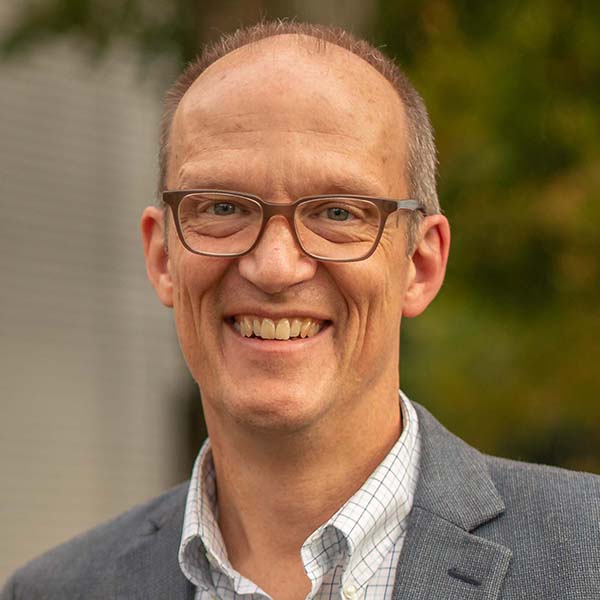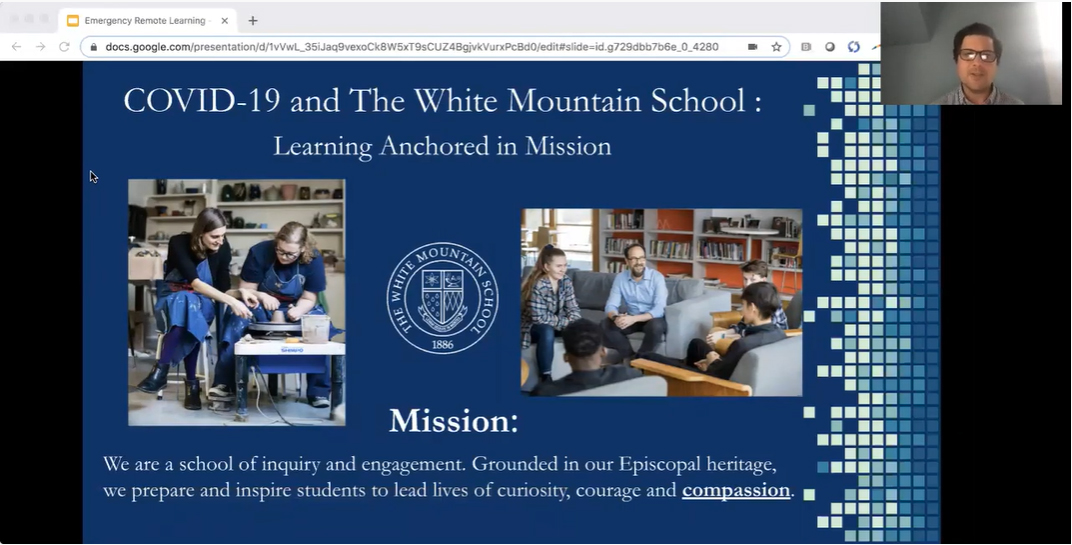By John Drew, Head of School, The White Mountain School (NH)
I am indebted to the White Mountain School faculty who did a remarkable job of caring for students while advancing their education during the final two months of emergency remote learning. So how did they do it? Were there recognizable keys to their success? Since each school is unique, there is no magic formula to share. I will propose a few characteristics that I believe enhanced our success in offering remote learning effectively this spring and set us up to continue to improve the education we offer students moving forward.
Making good use of a single week of preparation speaks to a willingness to get on board quickly. Several skilled administrators and teachers pulled together an intense immersion into remote learning. A key piece of this training was that we engaged with teachers in the way that they would be engaging their students, and asked for constant feedback so that we co-constructed the experience with our faculty. While at that point we could have been in-person, we chose to conduct all of the sessions in a combination of synchronous and asynchronous learning, all virtual. We learned from each other; and learned by doing.
I got a first sense of the adaptability and resilience of this group at the beginning of this school year. I am new to the school and wanted to join the long-standing tradition of Orientation trips for all students. The morning after arriving on campus for the new year, everyone packs up and hits the road for a three-day outdoor adventure. The weather that morning was in the low 50’s, windy and raining as we loaded up vans and buses. Adult tone and body language, which I assumed might be at least variable, was almost uniformly upbeat. Students, some of whom had not spent much time outdoors, looked at these eager adults, shrugged, and got in the vehicles. Lesson one—this group’s culture, in keeping with our enduring engagement with the outdoors, embraces the need to adapt.
As has been documented everywhere, adapting to remote learning required a shift to more technology use. It would have been very difficult if a significant cohort of our faculty were unwilling or unable to engage effectively with the streamlined list of tech tools that we identified. I have never been a fan of fads, or the “next shiny thing” approach to educational innovation, particularly with regard to technology. So I appreciate teachers who possess a healthy skepticism about a major change. Yet healthy skepticism is different than wearing tech ignorance as a badge of honor. Happily, our faculty was open (even if not always thrilled), to expand their academic technology toolkit. Lesson two — this group embraces technology not as the point of education but as a very useful tool.
A balance between interest in the craft of teaching and devotion to one’s discipline is another dimension that seems important here. This idea tracks closely with an interest in putting students at the center of learning and helping them discover their own interests as opposed to delivering to them what adults identify as important. Approaching this work with humility helps. One of the most crucial 21st-century skills required at this moment is a belief in being a life-long learner not just about one’s subject matter, but about the craft of teaching. Lesson three—open-mindedness and curiosity about other ways of teaching is key.
I’m reminded of my son’s soccer club’s Irish coaches. One of the highest compliments they gave to players was saying they “get on with it.” That phrase puzzled me until I realized they meant that they respected players who would show up and work hard, trusting the coaches to guide them. That’s a virtue worth highlighting: you need a group who will “get on with it.” The circumstances this semester have been remarkably challenging, and I am particularly grateful for the leap of faith our faculty took in trusting school leadership (particularly a new head of school they did not yet know well). Lesson four—persistence paired with trust is powerful.
An important question, of course, is what the “it” is in “get on with it.” White Mountain’s remote learning goals align with our long-term goals, centering education on student-driven inquiry. Despite COVID, we went ahead with our first Inquiry Summit, which replaced traditional exams this semester. Students created digital portfolios that described their growth as a learner this year or semester. They then presented these portfolios to peers and faculty. However disrupted their semester had been, a remarkable number of students were able to reflect productively on their learning and to curate strong portfolios while at home. The roots of the Summit are fairly deep at White Mountain, but this event did represent a very different way of completing the year. In a season of so much change, we leaned into an event that had been planned, but was new to us, to great effect.
So we complete this extraordinarily challenging semester with a sense of exhaustion, but also accomplishment. While the pace of change required of schools at this moment is significant, I have confidence that our faculty will meet future challenges well because of their willingness to engage with the problems at hand, and to model the qualities our School mission hopes to inspire: curiosity, courage and compassion. We’re focusing on supporting our BIPOC students and employees, adding a Social-Emotional Learning program, and creating layers of support to adults and students alike to prepare for whatever the future holds. We’re refining an approach to education that works for students even under trying circumstances and will serve their needs as life-long learners. Thanks to a strong team of adults.
This article was written by John Drew, Head of School, The White Mountain School (NH)

A career-long environmental science teacher and track coach, John Drew came to White Mountain in July 2019 after a 21-year career at Concord Academy (MA). At Concord, John served in several capacities, including as assistant head, a science teacher, a coach for cross country and girls’ varsity basketball, and a house faculty member. Prior to working at Concord Academy, John served as a health educator and coach of cross country and track and field at Penn State Behrend. Before that, he taught and coached at the Potomac School (VA), where he directed the summer academic program and served as a founding advisor for the school’s first multicultural affinity group. He began his teaching career in 1985 at the Field School in Washington, D.C., where he worked with the science department to offer one of D.C.’s first high school HIV/AIDS education programs.


